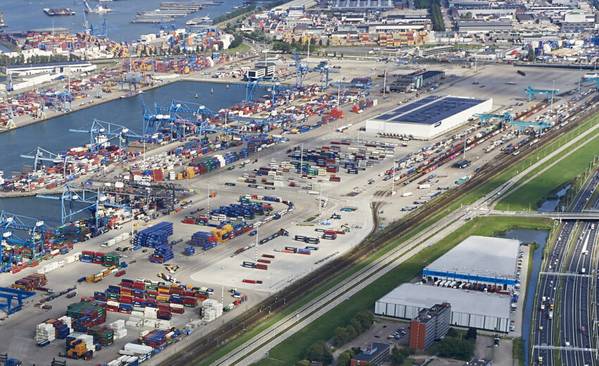
Procedures have been overhauled in a critical link between Europe’s rail freight and shortsea networks in Rotterdam, in an upgrade responding to customer feedback which also enhances multimodal transport competitiveness.
Rail Service Center Rotterdam (RSC) loads and discharges 14-15 freight trains daily on average, at a state-of-the-art terminal fed by nine train service providers weekly from all over Europe. While many of the estimated 270,000 cargo units passing through each year are redistributed overland, significant numbers transfer to shortsea ships. Around 70,000 units move via the nearby Rotterdam Shortsea Terminals (RST).
In a project initiated by the boards of the two terminal companies and supported by Samskip, work began in May 2022 to eliminate inefficiencies in the connecting ‘shunt’. All three parties recognise optimising the modal switch of unitised cargoes at Europe’s largest container port as a material factor in shipper transport choices.
“Reliability and predictability are cornerstone advantages for multimodal freight compared to road transport,” said Peter Willemse, Head of Ports and Terminals, Samskip. “Road freight not only causes more pollution; it faces increasing congestion, driver shortages and more bureaucracy than other options. It’s therefore critical we resolve challenges in the multimodal chain. RST needs high performance rail links and RSC needs shortsea traffic. Together, we have focused on the shunt to make sure units reach the ship or train they are booked for.”
Based on an RST initiative to engage a Six Sigma Black Belt specialist, the partners formed a 10-strong team to perform in-depth analysis across 14 work items on operations, with partners reviewing progress bi-weekly. In addition to greater collaboration on workflow and prioritisation, the outcome introduces lean process management to the entire operation.
Key performance improvements have already been achieved, especially by eliminating misinterpreted through-transport instructions passing between the parties, and by firming up and aligning procedures. Other gains have flowed from a better definition of closing times/peak traffic hours at each terminal, and by escalating awareness when shunting assets are under-utilized. Over 98% of containers are now meeting allocated ship or train slots, while new procedures are also prioritising corrective action where slots are missed.
“Of course, 100% is the ideal, but the focus is practical: procedures and communication need to improve so that the overall performance gains are permanent,” said Arno Storm, CEO of RST. “The facilities, hardware and equipment used by both RSC and RST are state-of-the-art, and we have now implemented significant improvements in data flows and processes to ensure that shunt operations support the highest performance standards.”
“This has been an invaluable project, where we have worked together to troubleshoot issues and set up procedures and solutions,” said Pierre van Dalen, Operations Manager, RSC. “Our common goal is to optimise efficiency and renew RSC’s ability to take advantage of growth in multimodal transport.
“We have established a permanent framework so that the shunt operation between our two terminals contributes to - rather than frustrates - the efficiency of transport providers, rail networks and all of our shortsea clients. Future work will focus on squeezing any remaining inefficiencies out of the process to shorten transit times.”



